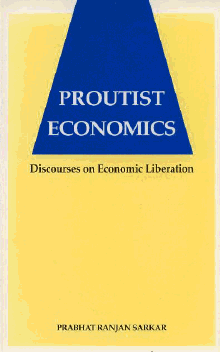Proutist Economics
| Proutist Economics | |
|---|---|
 "Proutist Economics": the front cover[1] | |
| Author | Prabhat Ranjan Sarkar |
| Language | English |
| Subject | Philosophy |
| Publisher | Ananda Marga Publications |
| Publication date | 1992 (IND) |
| Media type | |
| Pages | 410 |
| ISBN | 81–7252–003–4 |
| Location in Sarkarverse | |
Proutist Economics - Discourses on Economic Liberation - is a book of 410 pages firstly published in Kolkata India on 1992 by the philosopher and social reformer Prabhat Ranjan Sarkar[note 1] aka Shrii Shrii Anandamurti (1921–1990).[note 2] The book is a part of the social writings of Sarkar's vast literary heritage.
Contents
PROUT, the "Progressive Utilization Theory" was conceptualised by the author in 1959. In this book for the first time all of P. R. Sarkar's published discourses on economics are compiled into one volume.
The concepts expressed by the author on this book, are considered from some researchers to be an appropriate answer to "the need for a new paradigm"[2] on the socio-economic sphere.
The "psycho-philosophy" suggested by Sarkar in his speech "Minimum requirements and maximum amenities", given in Kolkata on October 13, 1989 and reported in the volume,[3] seems to provide the theoretical support to prevent the exploitation in the psycho-economic context,[4] considered by the author (in his speech "Capitalism in three spheres", given in Kolkata on 1981), as "the latest form of dangerous and all-devouring capitalist exploitation".[5]
The essential characteristic of Sarkar's unique vision expressed in the volume is that economics must liberate humanity from mundane problems so that all people will have increasing opportunities for intellectual and spiritual liberation. In the process, he sets out innovative ideas to help solve today's socio-economic problems.
Chapters
The discourses are arranged into six parts. In each part the talks are generally placed in chronological order:
- Part 1: Key principles[6]
- 8 chapters (1 to 8) describing the the essential principles for economic liberation as based on PROUT’s economic system.
- Part 2: Economic progress - Beyond materialism[7]
- 4 chapters (9 to 12) providing a brief critique of capitalism and communism, the dominant materialist theories in the world today.
- Part 3: Rural development for collective welfare[8]
- 7 chapters (13 to 19) explaining how rural development should be structured for collective welfare. It stresses the need for coordinated cooperation in agricultural production.
- Part 4: Economic decentralization - Elevating the standard of local people[9]
- 5 chapters (20 to 24) sets out the conditions necessary to raise the standard of local people through economic decentralization.
- Part 5: Multi-purpose development[10]
- 6 chapters (25 to 30) outlines some policies that can be immediately adopted to alleviate the suffering of downtrodden people.
- 9 chapters (31 to 39) including a detailed discussion of some case studies from northeastern India, and provides practical examples of how to elevate the economic standard of the people living in this region.
References
Footnotes
- ^ Giani Zail Singh, seventh president of India has said about Sarkar: "Prabhat Ranjan Sarkar was one of the greatest modern philosophers of India. (Inayatullah, 2002).
- ^ Between 1955 and 1990 the author wrote in English, Bengali and Hindi. He wrote in the name "Shrii Prabhat Ranjan Sarkar" when treating sociology, economics, philology and various other subjects, and in the name ""Shrii Shrii Ánandamúrti"" when focusing on spiritual topics. Many of his books he gave as dictations; others were compiled from his discourses, some of them in small pocket-books.
Citations
- ^ "Proutist Economics" cover page as it appears on the publisher's web site, Ananda Marga Publications, 2012, retrieved 24 December 2012
- ^ Shambushivananda 1989, p. chapter 1.
- ^ Sarkar 1992, p. 63.
- ^ The concept of "psycho-economic exploitation" was previously more clearly defined by Sarkar with his speech "The Fundamentals of Language" given in Kullu on November 1, 1983 and published on (Sarkar, 1984).
- ^ Sarkar 1992, p. 77.
- ^ Sarkar 1992, p. xv.
- ^ Sarkar 1992, p. 73.
- ^ Sarkar 1992, p. 103.
- ^ Sarkar 1992, p. 191.
- ^ Sarkar 1992, p. 239.
- ^ Sarkar 1992, p. 275.
Sources
- Sarkar, Prabhat Ranjan (1992), Proutist Economics, Kolkata: Ananda Marga Publications, ISBN 81-7252-003-4
- Sarkar, Prabhat Ranjan (1984), A few problem solved, Part 4, Kolkata: Ananda Marga Publications
- Shambushivananda (1989), PROUT. Neo-humanist Economics, Mainz: Dharma Verlag, ISBN 3-921-769-19-2 Check
|isbn=value (help)
